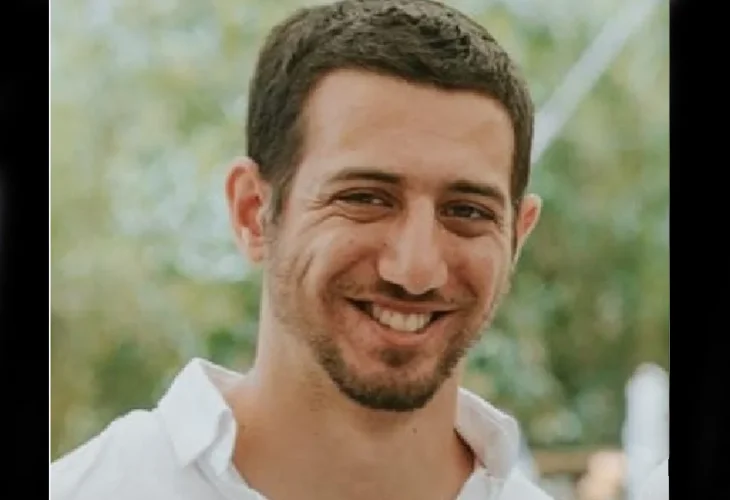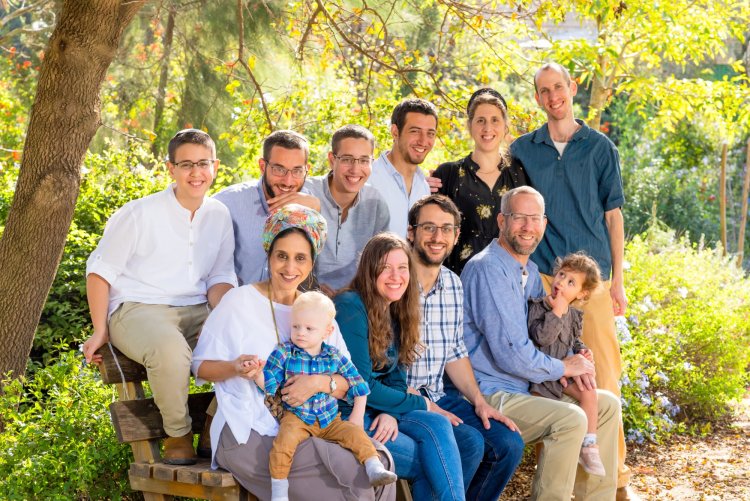"A Few Weeks After Eitan Was Killed, We Discovered the Last Letter He Wrote Us"
A year has passed since Eitan Koplowitz fell in Gaza, yet his stories of heroism and captivating personality continue to resonate. His mother, Rely, shares her pain and pride in his unique path and the powerful legacy he left behind.
 Eitan Koplowitz, may his memory be a blessing
Eitan Koplowitz, may his memory be a blessing"There is no end to the memories of Eitan," says Rely Koplowitz as she speaks longingly of her son Eitan, who was killed last year in Gaza, leaving behind parents, four brothers and a sister, his partner and a small baby born during the war, who barely got to know him.
"Soon we will mark a year since his fall," adds Rely, "but the stories about him only grow by the day, and we keep hearing from people who knew him from all kinds of circles how much they remember him, learned so much from him, and see him truly as a figure of admiration and inspiration. Eitan was truly a very special person, with a captivating charm, a good heart, and many values. Anyone who knew him closely simply felt appreciation towards him, whether it was his trainee, friend, or senior officer in the army."
 Eitan and his family (third from the right in the top row)
Eitan and his family (third from the right in the top row)Willpower and Seriousness
Rely recounts that since Eitan was little, they recognized that he had a backbone, he knew what he wanted for himself and did not give up on his goals. "When he was in first grade," she recalls, "he started a basketball club, and every week he went diligently to participate in the club, with all seriousness and full gear. When he returned, I would try to probe him: 'Well, did you score?' and he replied negatively. So it was for half a year, and at some point, I was already thinking of maybe transferring him to another club, until one day he came to me, happy and said: 'Today I scored.' He did not remember the failures of the first six months later, when he became the most outstanding player in the settlement. But I remembered the long way he went, because it always characterized him—with an incredible willpower, and a clear decision—that if he wants to succeed in something, he will do it no matter what.
"This willpower developed in him a backbone that made him adhere to truth and his internal values, without considering what others say. I remember that he was just a nine-year-old boy after Passover when I noticed he was not collecting wood for the Lag Ba'omer bonfire like his friends. I asked him: 'Eitan, why aren't you collecting wood?' He replied: 'It's Holocaust Remembrance Day, mom; it's not a suitable time to collect.' No one told him that, but in his heart, he felt it was inappropriate."
Rely notes that when Eitan reached enlistment age, he aspired to be accepted into one of the reconnaissance units and undertake the most distinguished service possible. "But during recruitment, it was revealed that he had a shoulder issue we didn't know about before, and the shoulder might dislocate under heavy loads," she explains. "Eitan, as usual, didn't give up on his dream, he underwent surgery to strengthen the shoulder, and later went to the reconnaissance day, where his shoulder dislocated, and he realized for certain that he couldn't be in the reconnaissance units.
"But he did not give up on his ambition to be in the combat forces, although his profile was initially lowered, making it impossible. Eitan fought to raise his profile until he reached 72, then he realized he could be in the Armored Corps and avoid carrying heavy loads. He started the program and excelled exceptionally in each course, becoming a professional officer who trained soldiers. Many of his soldiers came to condole us during the shiva, and some said he taught them for just four months, yet was so significant for them, accompanying them long after they parted."
 Eitan Koplowitz, may his memory be a blessing
Eitan Koplowitz, may his memory be a blessingA Knock on the Door
Eitan's next stop was at the Hebrew University of Jerusalem, where he studied law and philosophy. As with every place he went, he gained a circle of friends and admirers there too. He married Yael, also a jurist, and together they made their home in the Nahlaot neighborhood in Jerusalem.
"On the Simchat Torah holiday of 5784, they were at home preparing to visit friends, but already in the morning started to realize there was chaos, and Eitan was drafted," Rely shares. "He was drafted for four and a half months, almost without any leave, except for a short one allowed for the birth of his son, Boaz, and afterward, he returned to continue the fight."
Rely notes that after the first round ended, Eitan was discharged and returned to his studies and work as a security guard at the Bank of Israel, but a few months later he was called for a second round. "He was already after completing his third year of studies, getting ready for internship interviews. Due to the reserves, his interviews were scheduled earlier, and he managed to complete them before returning to the army. One of the office managers who interviewed him came to our shiva and said to me: 'I usually interview interns for 20 minutes, but with Eitan, I sat for an hour because it was so enjoyable to talk with him.' He also mentioned that at the end of the conversation, he told Eitan: 'If you want to work with us, know that you are in.'
"Actually, Eitan was at the best stage of his life, about to begin his internship, a husband to a wonderful woman, and a father to a baby he loved so much, but then he entered a second round of fighting in Gaza. He fought for about two and a half weeks, and then—two days after the Shavuot holiday, their tank hit an explosive device, and the outcome was severe: out of four on the tank, Eitan and Ilan Weis were killed on the spot. The other two soldiers—Nati Kugel and Nir Hadad managed to get out of the tank wounded. Nir passed away from his wounds a few months later, on the Fast of Gedalia, and Nati remained alive, thank God, and we keep in touch with him to this day."
When did you last speak with Eitan?
"The incident happened on Shabbat at five in the afternoon, and we spoke with Eitan on Friday morning. This was when Yael came to us with baby Boaz, and suddenly Eitan called on a video call. It was surprising because he hardly had a chance to make contact, and we were very happy for the opportunity to speak with us all together. He looked so happy and joyful, sitting on a couch in Gaza. I have to admit that earlier I was really worried about him, but after that call, my fear completely subsided. But we received the hard news only after the Shabbat ended, after Havdalah, three officers knocked on the door, and we immediately understood."
Does little Boaz recognize his father's photo? Do you tell him about him?
"There are pictures on the refrigerator, and he knows to point and say 'That's dad' and 'That's mom', but he obviously doesn't understand anything in depth, and the thought that he will never get to know his father pierces our hearts. But I believe over the years we'll manage together with other family members and Eitan's friends to tell Boaz who his father was and make sure he knows about the special father he had."
Have you thought of a way to commemorate Eitan?
"The truth is almost a year has passed, and we are still deliberating. A few weeks after Eitan was killed, Yael returned home, opened the computer, and saw a letter Eitan left for her, portions of which were published in an especially touching book recently released that compiles 49 last letters of fallen soldiers. In the letter, Eitan touches on the subject of commemoration, writing: 'I have no interest in volunteering or establishing an observation point or promenade in my name because I feel the public is already tired of memories. Let's embrace the religious ritual—visit the grave, say a few verses, and go home, and when you feel it's burdensome and you need to recruit nephews to complete a minyan, that's the time to stop, and I will certainly forgive you.'
"With such words, we need to think carefully about a suitable and non-routine way of commemoration. Meanwhile, we are collecting every letter he wrote and various writings he composed about life and the world. It's clear to us they will all come to use one day, but we need to think about how to do so in a way that suits Eitan and what he was—more importantly, what he left behind in an unforgettable manner."

